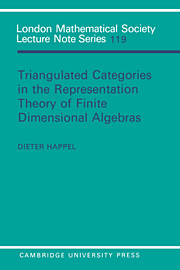Summary
The aim of these notes is to show that the concept of triangulated categories might be useful for studying modules over finite dimensional k-algebras, where k is a field which for technical reasons usually will be assumed to be algebraically closed. On the other hand we try to show that certain triangulated categories become quite accessible if one applies methods of representation theory emerged in recent years.
Let A be an abelian category, then the most famous example of a triangulated category is the derived category DB(A) of bounded complexes over A. Usually we will be interested in the case that A is the category mod A of finitely generated left modules over a finite dimensional k-algebra. In this case the category Db(A) = Db(mod A) may be identified with the homotopy category K-,b(AP) of complexes bounded above over the finitely generated projective left A-modules having bounded cohomology. Since their introduction in the sixties they have turned out quite useful in algebraic geometry and homological algebra. Examples for this can be found in duality theory (Hartshorne (1966), Iversen (1986)) or in the fundamental work on perverse sheaves by Bernstein, Beilinson, Deligne (1986).
The concept of derived categories goes back to suggestions of Grothendieck. We refer to Grothendieck (1986) for some information about the motivations and developments. The formulation in terms of triangulated categories was achieved by Verdier in the sixties and an account of this is published in Verdier (1977). We will assume that the reader is familiar with the concept of localization which is needed in the construction of the derived category.
- Type
- Chapter
- Information
- Publisher: Cambridge University PressPrint publication year: 1988

